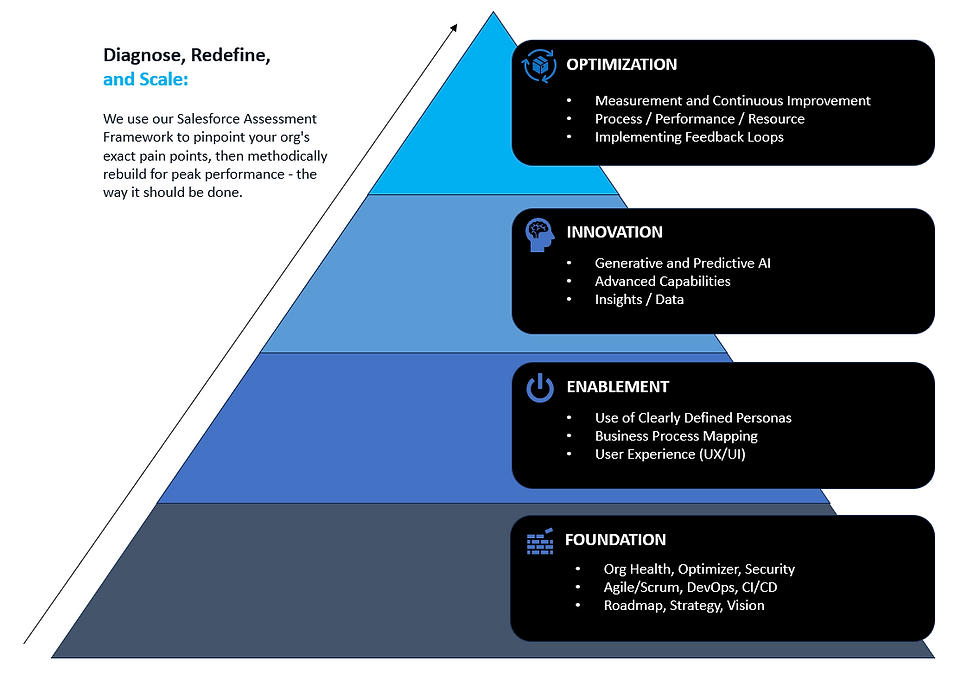The Vanity Trap: Ditch the Noise, Embrace Insight - Master Your Metrics with Salesforce
- Jon Ewoniuk
- Jan 7, 2024
- 3 min read
Let's face it, the world of business metrics is a swirling vortex of numbers, graphs, and dashboards. It's easy to get sucked into the "more is more" mentality, chasing every shiny object.
But here's the truth: most of those flashy metrics are just vanity mirrors, reflecting a distorted image of your business and operations.
Stop the madness... It's time to escape from the vanity trap and **embrace the power of relevant, actionable metrics. In this post, we'll equip you with the tools and knowledge to navigate the Salesforce data jungle and unearth the KPIs that truly matter.
Step 1: Excavating the Gold From the Grave
Think of your Salesforce as a gold mine brimming with valuable nuggets of data. The problem? They're buried under layers of irrelevant metrics, like the number of times someone clicks "refresh" (seriously, who are these people?).
Your first task is to identify the KPIs that align with your core business goals. Ask yourself:
What are we trying to achieve? Increase revenue? Improve customer satisfaction? Boost retention rates?
What key activities drive those goals? Lead generation, conversion, customer interaction, etc.
What measurable indicators demonstrate progress in those activities? Lead conversion rate, average deal size, customer satisfaction score, etc.
Step 2: Building Your KPI Dream Team
Don't fall into the trap of "KPI overload." Choose a select group of core metrics, no more than 5-7, that capture the essence of your business health. Think of them as your KPI A-Team: a lean, focused squad delivering maximum impact.
Here are some examples of key metrics for different business areas:
Sales: Lead conversion rate, pipeline velocity, average deal size, sales cycle length.
Marketing: Website traffic, lead generation cost, conversion rate of marketing campaigns, customer acquisition cost (CAC).
Customer service: Customer satisfaction score, resolution time, number of repeat customers, net promoter score (NPS).
Step 3: Making Numbers Matter in Salesforce
Now that you know your "who" and "what," it's time to build the "how." Salesforce offers plenty of reporting and dashboard tools to transform raw data into actionable insights.
Here's how to leverage them:
Custom reports: Filter and drill down into your data to uncover hidden trends and patterns.
Visualizations: Use charts, graphs, and heatmaps to make complex data easily digestible.
Dashboards: Create a central hub for your key metrics, providing a real-time pulse of your business.
Step 4: From Insight to Action: Decisions, Not Decorations
The true power of KPIs lies not just in understanding the numbers, but in acting on them. Regularly review your metrics, identify areas for improvement, and implement data-driven decisions.
Don't let your dashboard become a digital museum of meaningless numbers!
Remember:
Focus on quality, not quantity. A few insightful metrics are worth more than a mountain of vanity numbers.
Align your KPIs with your goals. Make sure they guide you towards achieving what truly matters.
Don't be afraid to iterate. As your business evolves, so should your KPIs.
By mastering your metrics in Salesforce, you can ditch the vanity trap and unlock the true potential of data-driven decision-making. Remember, it's not about the numbers themselves, but the informed actions you take based on them.
P.S. Need help identifying and tracking your key metrics in Salesforce? Peak360 IT can help. We offer expert consulting services to help you transform your CRM into a powerful engine for growth.
Let's turn your Salesforce data from vanity to victory...
By: Jon Ewoniuk
Book a Free Call here.
Jon is the Founder | Consultant at Peak360 IT. Peak360 IT helps companies solve technical, resource, and implementation challenges on the Salesforce platform. Founded in 2014, Peak360 IT is a Salesforce SI Partner that specializes in Sales Cloud, Service Cloud, Experience Cloud - and implementing custom applications and automations on the Salesforce Platform.
With our backgrounds in Software Development, Technology, and Consulting - Peak360 IT has a reputation for developing custom integrations using various technologies, such as MuleSoft, Google Apigee, and other SOA/API frameworks.



Comments